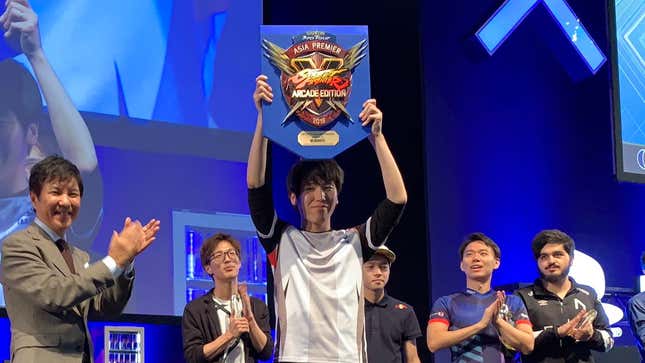
This past weekend, a legendary Street Fighter player placed first in what was perhaps the most stacked Street Fighter V tournament ever, but he will only be taking home a fraction of his prize money. That’s due to Japan’s heavily restrictive laws on competitive gaming and his own personal principles.
Yusuke Momochi is one of the greatest fighting game players of all time, with major victories in various tournaments spanning all the way back to 2007. While he has dabbled in other games, Street Fighter continues to be his main area of expertise, and his legacy has continued into the release of Street Fighter V. Last weekend, Momochi traveled to Tokyo Game Show for the Capcom Pro Tour’s Asia Premier. Over the course of the competition, he managed to edge out over 1,000 of his fellow competitors to eventually place first, earning him a huge amount of ranking points towards Capcom Cup qualification. His monetary compensation, however, has hit a bit of a snag.
Owing to its importance on the Capcom Pro Tour, the Asia Premier event featured a big prize pool, with the champion set to take home 5 million yen (or around $46,000 USD, according to current conversion rates). But the delivery of that prize money would depend on their status as a licensed player. Due to Japan’s harsh restrictions on competitive gaming—which the country legally considers a form of gambling—the Japanese eSports Union (JeSU) was formed to help competitors make a stable career out of esports. JeSU partnered with various game developers and began issuing special pro gamer licenses to players in 2018. These licenses would allow their recipients to earn money during official competitions hosted by Capcom, Bandai Namco, and the like. Without a license, players couldn’t take home as much prize money. It would instead be capped at 100,000 yen, or around $900 USD.
Momochi has been critical of this licensing system in the past, expressing skepticism that JeSU should be the arbiter of who does and doesn’t get to be a pro player. While it has yet to be confirmed, many believe he was the sole holdout when JeSU and Capcom offered licenses to 22 top Street Fighter V players last year. Since then, the two organizations have continued to award licenses to competitors who manage to win money at developer-backed events to ensure they receive the entirety of their promised prize. Momochi has apparently continue to stick to his guns, even though these principles have made his ability to benefit financially from Street Fighter competition into a confusing mess every time he gets far enough to earn some scratch. Naturally, this issue reared its ugly head once again last weekend after Momochi managed to win the Asia Premier event.
Momochi touched on this topic during his first Twitch stream after the tournament. According to a summary of the stream by Andrew “jiyuna” Fidelis, a long-time fighting game player who helps bridge the language barrier between Japan and English-speaking communities, Momochi said on the stream that he will only be receiving 60,200 yen (or around $558 USD) of the 5 million yen ($46,000) championship prize. Kotaku contacted both Capcom and Momochi about this situation but had yet to hear back at the time of publishing.
It’s unclear where things go from here. A recent ruling shared by JeSU that was translated by a separate party appears to indicate that licenses may no longer be required to receive money from esports tournaments for games that are free to play or don’t allow players to become stronger with money (i.e. pay-to-win mechanics), but it’s unclear how this will affect future competitions or when it will go into effect. Momochi, for his part, seems content to continue to hold out on the JeSU system entirely, even if that means missing out on big money in the process. Until Japanese regulations change in favor of competitive gaming or JeSU itself addresses Momochi’s concerns, an alternative path forward isn’t readily available.